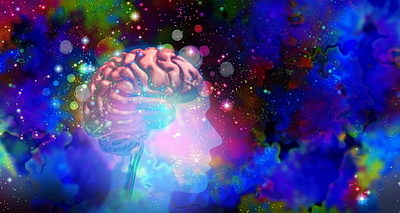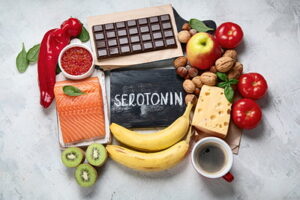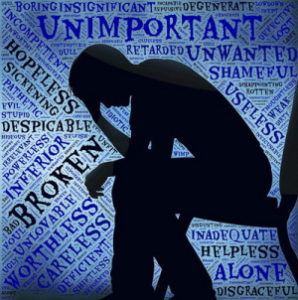
Overview
Before we proceed to discuss the benefits of serotonin, let us review the tasks of neurotransmitters. Simply stated, information from one cell will send information to the next cell by jumping across a synapse (the gap between cells).
If you are unfamiliar with this process, our article on brain cells will help clear up any confusion you may have, but keep in mind that neurotransmitters don’t only function in the brain.
This article will discuss what serotonin is, how it works, and ways to naturally increase its levels, and we will explore how certain medications can be used to treat serotonin-related disorders.
By understanding the effects of serotonin, we can help maintain a sound mind and body. So let’s begin.
What is Serotonin?
This is an important chemical found throughout the human body. It is produced in the brain, gastrointestinal tract, and kidneys. It plays a key role in the regulation of mood, appetite, sleep, memory, and learning, and in so doing, it is often coined the “happy hormone”.
With that said, any serotonin deficiency can have a major impact on your health, especially, your mental health. Once in the synapse, neurotransmitters connect the chemical with receptors on the neighboring cell. This communication between neurons is what allows us to think, feel, and act.
How Does It Work?
Serotonin is produced by a chemical reaction between amino acids and enzymes. Once it is produced, it is stored in specialized cells called vesicles. The serotonin travels out of the vesicles and across the synapse to neighboring neurons and as mentioned, the neurons that serotonin affects are responsible for mood, appetite, sleep, and thinking. Therefore, any changes in serotonin levels can lead to changes in these functions.
How Does Serotonin Affect Your Mental Health?

A person’s cognitive health is affected by many factors. These include genetics, past traumas, relationships, current health, and daily habits. Let’s take a closer look at serotonin’s effect on these functions:
- Mood: Mood is often the first thing to be affected when serotonin levels start to drop. If its levels drop too low, they may result in a condition known as serotonin deficiency. A serotonin deficiency is often associated with symptoms of depression and anxiety.
- Appetite: Serotonin helps regulate appetite by triggering the sensation of fullness. Therefore, increased serotonin levels can result in a lower appetite. A serotonin deficiency, on the other hand, can result in increased appetite.
- Sleep: A serotonin deficiency can result in insomnia and a serotonin excess can result in hypersomnia (excessive sleep).
- Thinking: Serotonin is associated with focus and concentration. Moreover, it is also associated with positive or negative moods depending on the situation. A deficiency can result in poor focus and a lack of concentration. This can negatively affect daily tasks that require a higher level of mental focus.
How to Naturally Increase Your Serotonin levels

Given that serotonin is so important to mental health, taking steps to increase its levels can have a significant impact on your health. Some ways to naturally increase serotonin levels include:
- Getting enough sleep: Sleep is essential for serotonin production. Any decrease in sleep can reduce its production and any increase in sleep can increase serotonin.
- Eating a healthy diet: A healthy diet is rich in vitamins, minerals, and amino acids, which are required to produce serotonin. A diet that is rich in these nutrients can help to naturally increase serotonin levels.
- Practicing a healthy lifestyle: Regular exercise, meditation, yoga, and other forms of relaxation are known to help increase serotonin levels.
What Foods Help Maintain a Healthy Serotonin Level?

Before we list some foods that are rich in serotonin, let us define tryptophan. This is an amino acid that plays a significant role in the production of serotonin and it is important to note that tryptophan cannot be produced naturally in the body. So with that said, let’s take a look at what foods contain this amino acid.
- Salmon. This healthy fish has been mentioned numerous times on our website. And why? Because of all the nutrients it contains, which includes tryptophan.
- Eggs: Another all-around healthy nutrient. In addition to all the other benefits eggs have, they are also rich in tryptophan.
- Green Leafy Vegetables: Any veggies of this type, such as spinach contain a good source of tryptophan.
- Pineapples: Eat them when they are fresh because they lose their serotonin levels as the ripening wears off.
- Nuts: All of our favorite nuts contain tryptophan.
- Tofu and Soy: Soy products are known to be significant in getting tryptophan to increase serotonin production in the body.
One note: Foods that are high in protein, such as salmon and eggs may compromise the serotonin boost even though they contain tryptophan, but if you add carbohydrates (carbs) to your meal, this can help keep tryptophan in the bloodstream.
Some healthy carb foods are brown rice, sweet potatoes, corn, bananas, and apples.
What Medications Can Be Used to Treat Serotonin-Related Disorders

Some of the most common serotonin-related disorders include depression, anxiety, insomnia, and obsessive-compulsive disorder. While some serotonin-related disorders can be readily managed with lifestyle changes, others may require the assistance of certain medications.
Antidepressants are the most commonly used meds to treat serotonin-related disorders. They are helpful because they increase the serotonin level, but they may also have a negative impact on other neurotransmitters. As a result, it is important to speak to your medical provider before taking any medications on your own.
Takeaways for Better Mental Health Management
Mental health is a cyclical process that is affected by many factors. These include daily habits, current health, genetics, and past traumas. Given the impact of these factors, it is important to take care of ourselves and manage our health more effectively.
One of the best ways to do this is by understanding serotonin and its effects. When serotonin levels are too low, a person can experience a serotonin deficiency, which can result in several mental health issues, including depression, anxiety, poor sleep, and poor focus.
Fortunately, there are several ways to naturally increase serotonin levels. These include getting enough sleep, eating the right foods, practicing a healthy lifestyle, and discussing with a medical professional.



 Feeling restless and scared due to a rampant and deadly viral infection is understandable. So, naturally, when the COVID took over, many people, especially those
Feeling restless and scared due to a rampant and deadly viral infection is understandable. So, naturally, when the COVID took over, many people, especially those 



 Americans have been increasing their dosage and intake of antidepressants like Prozac, Celexa, and Effexol just to name a few. According to a
Americans have been increasing their dosage and intake of antidepressants like Prozac, Celexa, and Effexol just to name a few. According to a Medical science, with all its innovations and advancements, has still not managed to tackle the underlying causes behind mental health issues. Surely, elements such as trauma and high stress have been identified as causation factors but doctors still have not been able to identify the root cause behind mental problems.
Medical science, with all its innovations and advancements, has still not managed to tackle the underlying causes behind mental health issues. Surely, elements such as trauma and high stress have been identified as causation factors but doctors still have not been able to identify the root cause behind mental problems. Depression can be described as a mood disorder. It may be classified as feelings of sadness, loss, anger or disappointment that impair a person’s day to day activities. The
Depression can be described as a mood disorder. It may be classified as feelings of sadness, loss, anger or disappointment that impair a person’s day to day activities. The 
 Although you might think it is the end of the world, it is not. Below are some suggestions that have been proven to work. All it takes is a simple tryout and then you can see which ones will work for you. The idea is to find something that will stop you from worrying and subsequently give your body some rest from feeling anxious, which can lead to numerous physical issues. You can stop it and if there is one factor to emphasize, it is don’t give up!
Although you might think it is the end of the world, it is not. Below are some suggestions that have been proven to work. All it takes is a simple tryout and then you can see which ones will work for you. The idea is to find something that will stop you from worrying and subsequently give your body some rest from feeling anxious, which can lead to numerous physical issues. You can stop it and if there is one factor to emphasize, it is don’t give up!




 There is nothing wrong with fantasizing about better times or thinking about things you might like to do in the future, so long as you keep it in perspective and don’t lose sight of the fact that it is not your reality just yet.
There is nothing wrong with fantasizing about better times or thinking about things you might like to do in the future, so long as you keep it in perspective and don’t lose sight of the fact that it is not your reality just yet. Anger can no doubt bring along stress and anxiety. One thing that should be done is not to keep that anger within yourself. Talk to someone about it. If they can’t help, at least you have an outlet to vent your frustrations.
Anger can no doubt bring along stress and anxiety. One thing that should be done is not to keep that anger within yourself. Talk to someone about it. If they can’t help, at least you have an outlet to vent your frustrations.



